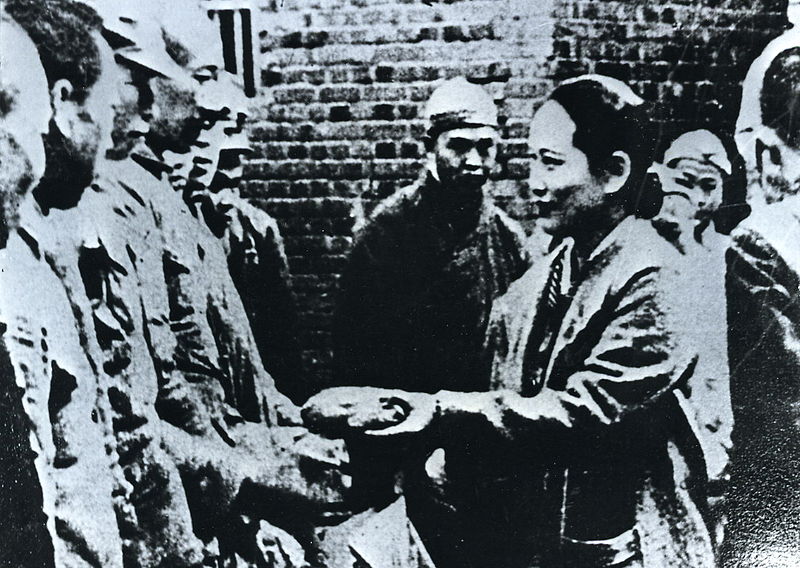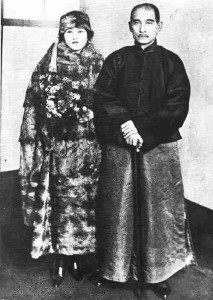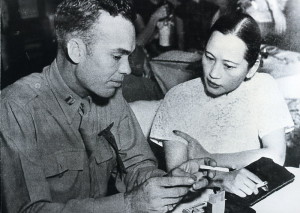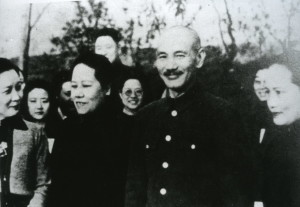Mme Sun Yat Sen, or Soong Chingling, was one of the most prominent figures of the Second Sino-Japanese War. On the photo above she is pictured with Chinese soldiers in the wartime capital of Chongqing. This article is written by Karla Weber Simon, a law professor and leading expert on civil society in China today and in history. She is the author of Civil Society in China (Oxford University Press, 2013).
After the Communist Revolution in 1949, private charity organizations were completely banned. Although they had existed prior to the Communist revolution, Chairman Mao thought charity came from “bourgeois” concepts and should be completely taken over by the state. Soong Chingling (and also Wang Guangmei (1921-2006)) helped revive concepts of private charity and individual social service after the death of Mao and the ascendency of Deng Xiaoping as China’s so-called “Paramount Leader.”
Soong Chingling (1893-1981) was a remarkable woman in her own right, but much of the prominence comes from her marriage to one of the most important Chinese leaders in the 20th century. Ms. Soong was married to Dr. Sun Yat Sen, widely esteemed as “The Father of his Country.” Sun led the revolution that overthrew China’s last imperial emperor, Pu Yi (celebrated in the well-known Bertolucci movie “The Last Emperor”).
Ms. Soong made important contributions to the development of a very backward country not only as the wife of an elite leader, but as a true revolutionary in her own right. Unlike the current practice of Chinese leaders’ wives remaining in the background in all ways, Ms. Soong was not a quiet wallflower. She was a prominent person and equal partner with her husband. Ms. Soong was an “enchanting” woman, according to many observers, but a this chapter shows, she was also very strong in the face of the overwhelming adversity that faced China during its war with Japan.
Not only was Ms. Soong the wife of a remarkable man, she was also the daughter of one. Her father was Charlie Soong, a wealthy Chinese businessman and banker in Shanghai, who was also a devoted Christian missionary. With the zeal of a true Christian, Charlie Soong sent his daughters to be educated at Wesleyan College in Macon, GA, an all-female school associated with the Methodist Church. Bright as they were, they all graduated. One of Chingling’s sisters, Myling, also married quite well politically – her choice was Chiang Kai-Shek, later to become Generalissimo of the Chinese Army that defeated Japan (and still later as the President of Taiwan, to which he and his family and friends fled after their defeat by Mao and the Communists in 1949 – along with many ancient treasures stolen from the Forbidden City in Beijing – but that is another story!) The eldest daughter, Soong Ai-ling, was the first to get married in 1914. Her husband was K’ung Hsiang-hsi, a wealthy banker and the richest man in China at that time. He also financed Generalissimo Chiang and served as a minster in the Nationalist government.
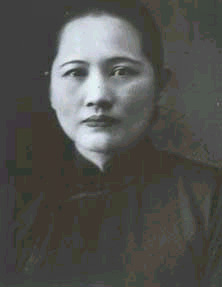 Soong Chingling was from her early days a “beautiful, elegant, and distinctive woman,” and she worked before their marriage as Sun’s secretary — he entrusted important papers and correspondence to her he could show to no one else during the years before the revolution he led. They met and married in Tokyo, when Sun was in exile. Soong Chingling’s parents opposed her marriage to Dr. Sun, in part because he was 26 years her senior (their marriage lasted only ten years before he died) and in part because he was a well-known and feared revolutionary.
Soong Chingling was from her early days a “beautiful, elegant, and distinctive woman,” and she worked before their marriage as Sun’s secretary — he entrusted important papers and correspondence to her he could show to no one else during the years before the revolution he led. They met and married in Tokyo, when Sun was in exile. Soong Chingling’s parents opposed her marriage to Dr. Sun, in part because he was 26 years her senior (their marriage lasted only ten years before he died) and in part because he was a well-known and feared revolutionary.
Conservative as they were, Charlie Soong and his wife did not have such radical ideals, but they had raised a smart daughter with extremely firm convictions. Once she became a believer in the revolutionary cause, she stuck to it, even after her husband’s death. Dr. Sun and Ms. Soong never had any children, and she never remarried. After the Nationalist Chinese (under the leadership of he brother-in-law Chiang Kai-shek!) purged the Communists and literally massacred many of them, the widow Soong Chingling fled to Moscow, where her beliefs were much better accepted. She also lived in Europe from time to time.
Returning to China, Ms. Soong began her career in charity work in 1938 when she founded the China Defense League (CDL) in the Nationalists’ second wartime capital, Chongqing, and became its first director. Later that year she helped to organize the “Chinese Industrial Cooperatives,” relief efforts aimed at encouraging coastal economic development and workers’ employment, two important initiatives in the poorer areas of China. All of this came during the trying times immediately after the Japanese invasion and the well-known “Rape of Nanking” (Nanking was the capital of China at the time of the invasion). An estimated 250,000 to 300,000 people died!
The Defense League was the first charity organization with which Soong was associated. It worked in the fields of maternal health and child welfare, both of which needed attention in these chaotic times. The League was also involved with finding funds from foreigners and Chinese people living overseas who were sympathetic to “China’s War of Resistance Against Japanese Aggression.” During the war years many privately founded charity organizations like the Defense League were sorely needed, especially for war relief efforts as the full-scale Japanese invasion proceeded to destroy countryside and cities alike. There are many accounts of private charity hospitals treating the people who were sick and badly injured by Japanese bombs and other tools of their invasion all over China, with dozens in Shanghai alone.
One of the Defense League’s primary activities was to use publicity about the war with Japan to raise money for the support of the destitute Chinese people. In a key act caused by her charitable feelings, Soong Chingling purchased an important painting called “Refugees” at an exhibition of contemporary Chinese art held in Hong Kong in 1939. The heartrending image, showing the horrific problems homeless war refugees faced in a cold and heartless winter, was made into a poster distributed in the campaign for donations.
It is not surprising that Soong became involved with the Defense League, given her background as the child of a devout Christian. She was also educated at a Christian college, which must have left a mark on her, even though she also became a dedicated Communist during this period, siding with Mao against the Nationalists after a major split in 1945, after the Japanese were finally defeated. Yet her deep feelings allowed Ms. Soong to play a strong role in the revival of private relief organizations after the 1950’s.
On October 1, 1949, Ms. Soong was a guest of honor at the triumphant festivities honoring the launch of the People’s Republic. She participated with great vigor. It resulted in a comic response — on October 9, 1949 the Los Angeles Times reported: “The Nationalist Cabinet today ordered the arrest and unspecified punishment of Mme. Sun Yat Sen but it was an empty gesture. She is in Red Peiping” (Ed.: the name for Beijing at the time).
Most important to this narrative is Soong Chingling’s work for social justice in China after the 1949 revolution Known as the “mother of public welfare,” Soong once again worked continually for the poor and downtrodden, especially for women and children. According to Deng Xiaoping’s address at her funeral in 1981, memorializing her work after 1949, “Comrade Soong Chingling had always been concerned with women’s work in the New China, cared passionately for the lives of the youth and children. She was in charge of People’s Relief Administration of China and the Red Cross Society of China for a long time.”
In view of her tireless support for revolution, charity, and social welfare in China, beginning with her marriage to Dr. Sun Yat Sen, the China Soong Ching Ling Foundation was established on May 29, 1982 in Beijing by China’s cabinet, with the initiation and support of senior leaders including Deng Xiaoping. The Foundation has moved its offices to a sleek modern building, where it pursues projects like the ones Soong was so passionate about during her life. Its mission is to “promote friendly international relations and safeguard world peace; to strengthen exchanges across Taiwan Straits and advance reunification of Motherland; to show concerns for the future of the nation and develop children’s work.”
Visiting Ms. Soong’s former Beijing villa in the mid-1990’s, when the Soong Ching Ling Foundation’s executive offices were still based there, one could see why it was such a favored retreat for a woman who had worked so diligently and bravely for China’s people and fought for their welfare. It is set in a leafy grove in downtown Beijing near Houhai Lake, but apart from the swirl of noise and traffic. It is clearly perfect for the purpose it now serves — a fitting memorial to Soong Chingling, the “mother of public charity” in China.
